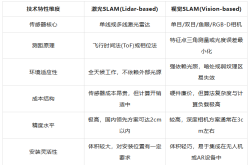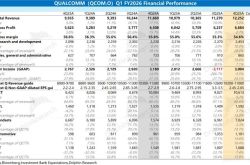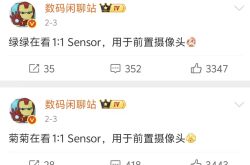Shareholders Are Not Jiyue's Shield
![]() 12/16 2024
12/16 2024
![]() 482
482
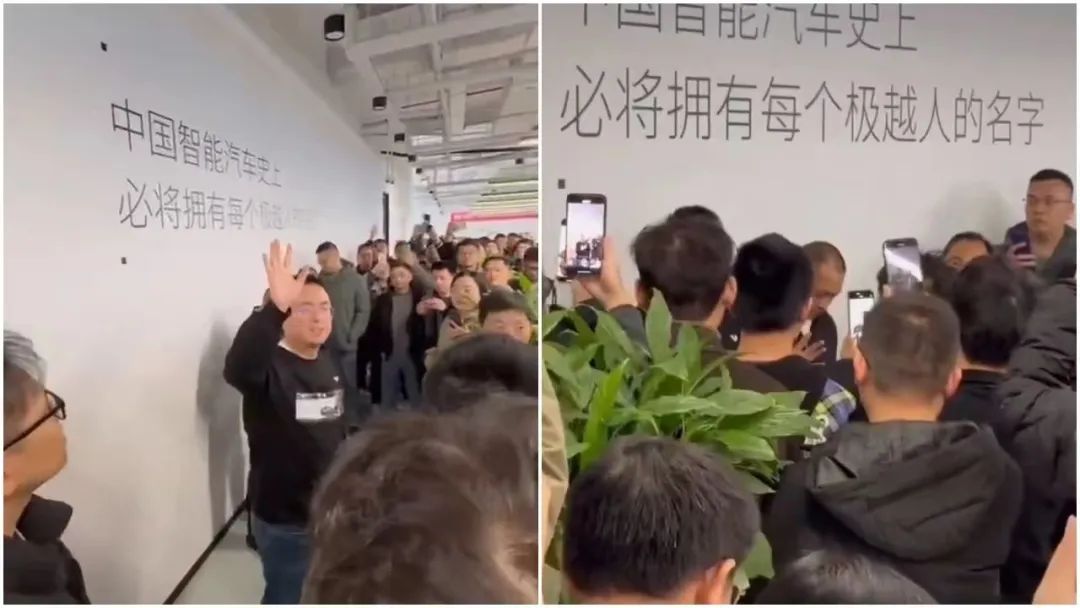
Produced by | Unique Observation Finance
Author | Yecha Baixue
Images | From the Internet
On December 14th, Wang Yunpeng, Vice President of Baidu Group and President of the Intelligent Driving Business Group, publicly reassured Jiyue car owners via his WeChat Moments: "We have already taken action. Intelligent driving and map navigation are guaranteed by us, so please rest assured, Jiyue car owners."
It is reported that Baidu Apollo, as a technology provider, supplies Jiyue with a pure vision-based ASD intelligent driving solution and lane-level navigation maps.

On the same day, Yang Xueliang, Senior Vice President of Geely Holding Group, also posted on Weibo, stating that Geely would ensure the normal use of vehicles and maintain after-sales service.
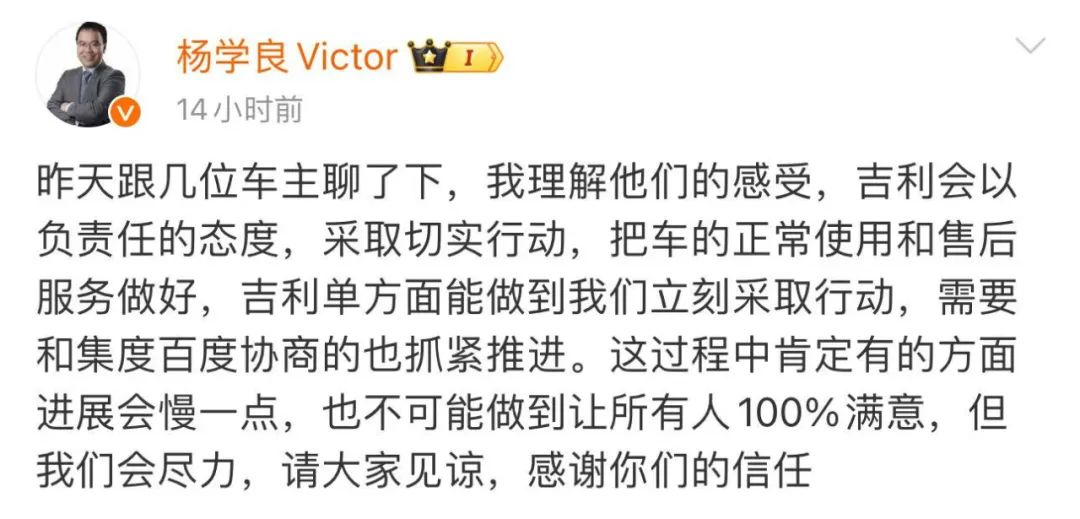
Following the Jiyue Automobile incident, Baidu and Geely issued a joint statement on the 13th, indicating their commitment as shareholders to actively assisting Jiyue's management in properly handling related matters.
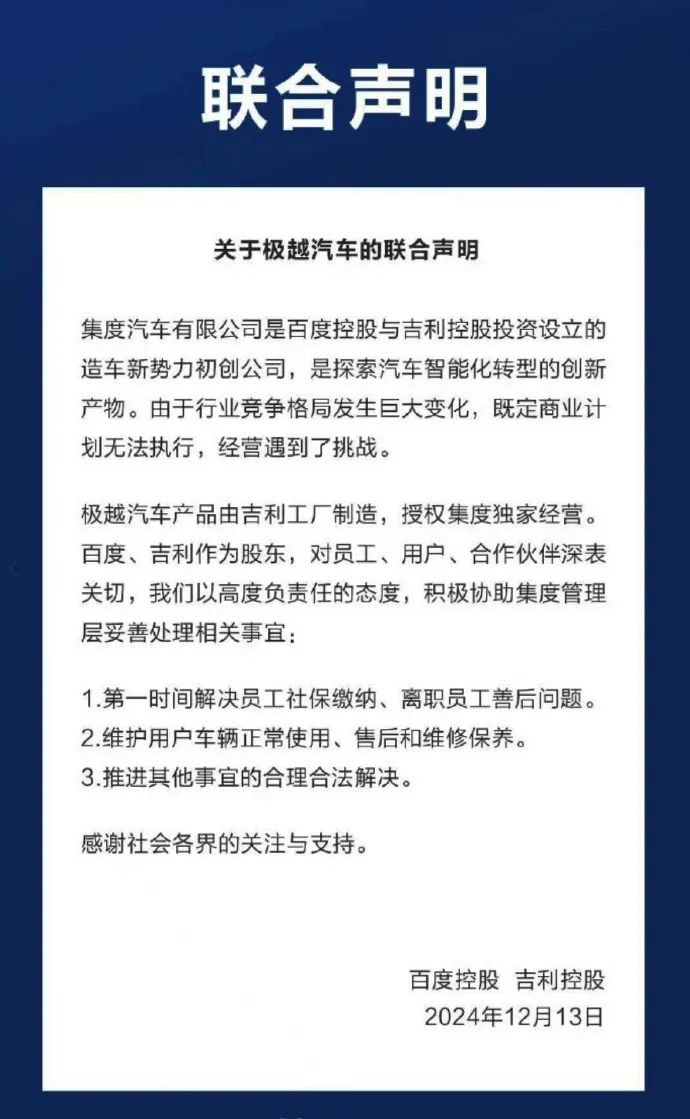
According to media reports, Baidu and Geely have not only completed the transfer process but also ensured that social security contributions for Jiyue employees are up to date.
As shareholders, Baidu and Geely have gone above and beyond their basic responsibilities, demonstrating commendable commitment.
Under the 'Company Law of the People's Republic of China,' Jiyue is a limited liability company, responsible for its debts with all its assets. Shareholders are only liable up to the amount of their capital contributions, setting a clear limit for potential losses in corporate investments.
Paying social security contributions beyond legal obligations reflects a deeper sense of social responsibility that transcends the typical shareholder duties.
The Jiyue incident raises a broader question: How should the responsibilities and rights of CEOs and shareholders be delineated?
Jiyue operates independently with its own financing and management. When faced with challenges, the CEO cannot evade responsibility by claiming they are not the primary responsible person. The CEO must distinguish between board voting rights and daily operational authority; while all boards have voting rights, decision-making and operational authority are distinct. The CEO is ultimately accountable for the company's daily operations.
In times of crisis, it is crucial for the CEO to take full responsibility, face challenges head-on, and seek solutions. The excuse of "I'm not the primary responsible person" is unacceptable as a means to avoid accountability.
Based on current data, Jiyue sold fewer than 15,000 vehicles in the first 11 months of 2024, falling short of its goal to open 250 stores by achieving only 140, or 56% of the target. The company also incurred a loss of 7 billion yuan in 2024.
Such operational performance reflects the business operators' decision-making and strategic execution capabilities.
Responsibilities and rights must be balanced. The CEO makes decisions regarding advertising, hiring, and events in daily operations but cannot evade accountability for mistakes leading to significant losses.
Ultimately, the CEO is responsible for resolving company issues.
In 2008, when Tesla was on the brink of collapse, Elon Musk invested his last $20 million and convinced other investors to follow suit, saving the company. Today, Tesla boasts a market value of $1.4 trillion.
While Baidu and Geely have stepped in to pay overdue social security contributions, emotionally and logically, Jiyue, as an independent corporate entity, must take responsibility for its 5,000 employees' compensation and future.
As listed companies, Baidu and Geely, as shareholders, acted prudently by halting further investments upon detecting issues, mitigating losses and protecting their shareholders' interests.
Entrepreneurship and investment inherently carry risks. Shareholders bear investment risks but should not be morally compelled to assume unlimited responsibility or cover for companies due to public pressure.
If investors were hesitant to become shareholders due to such pressures, startups would suffer, reducing funding sources. A thriving market economy requires active startups and capital.
We need a rational, orderly, and clearly regulated market economy that encourages bold investments, provides opportunities for entrepreneurs, and fosters technological and business model innovations, ultimately benefiting ordinary people through more job opportunities and income.
In handling issues like Jiyue's, adhering to the law is paramount. Bankruptcy liquidation should be considered when necessary. As stated in the joint statement by Baidu and Geely, the legitimate interests of all parties, including employees and shareholders, must be protected in accordance with the law.

